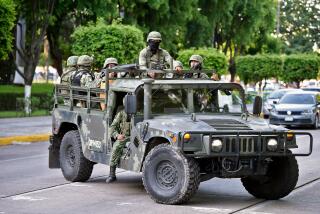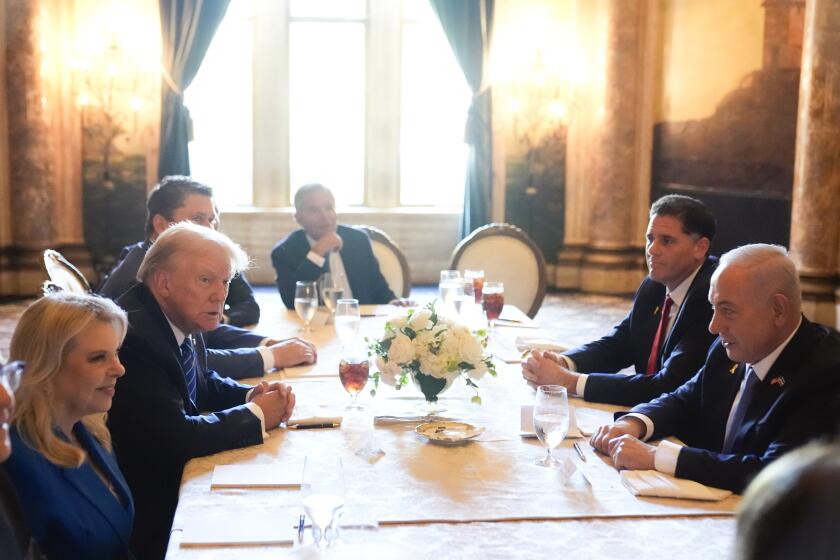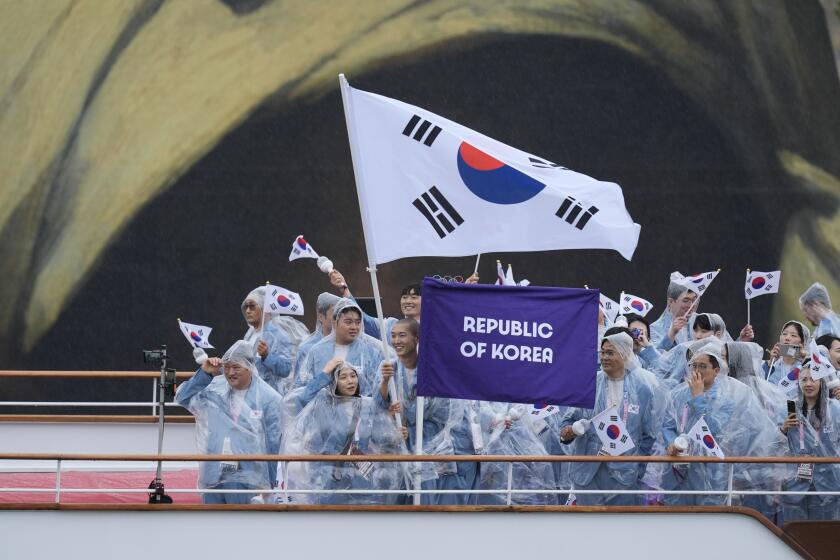NRA Chief Disavows the Militias : Firearms: Group’s leader seeks to distance lobby from extremists and says he backs hearings on their activities. But he vows to keep pushing for repeal of the ban on assault-style weapons.
The head of the National Rifle Assn. sought Sunday to distance his organization from the actions of anti-government extremists as he expressed support for congressional hearings on citizen militias and disavowed any NRA connection to the groups.
But Executive Vice President Wayne R. LaPierre vowed that the NRA will keep pressing to repeal a ban on assault-style weapons, even as a key senator said the pro-gun lobby lacks the votes.
Appearing on the CBS-TV news program “Face the Nation” on the last day of the NRA’s national convention in Phoenix, LaPierre said he would support hearings on the activities of the paramilitary militias, which have been under scrutiny since the April 19 bombing in Oklahoma City.
At the same time, he made it clear that his 3.5-million-member organization has no plans to abandon its legislative priority of rescinding the prohibition against the manufacture and sale of 19 kinds of military-style semiautomatic assault weapons.
And he vowed that the NRA will seek to block the reelection of President Clinton, who signed the gun ban into law last year.
Despite widespread public support for the ban, LaPierre said his organization will keep pressure on Congress to overturn it “because I think that [the ban] has as much to do with crime control as making a wish while you blow the candles out on a birthday cake.”
“The same guns are still being made. Criminals weren’t using those guns in crime anyway. So it’s pretend.”
But the chief sponsor of the ban, Sen. Dianne Feinstein (D-Calif.), said on the same program that she has rounded up enough support to prevent the NRA’s allies from prevailing if the issue comes to a vote.
“We have more than enough votes in the Senate to stop a repeal,” Feinstein said. “Things have changed. As I go from member to member and ask them about their position today, I have members that tell me even though they didn’t vote for [the ban] the last time around, they would not vote to repeal it because they believe it sends the wrong message.”
Still, there is no question that the balance in Congress has shifted since the ban was passed last year.
The NRA gave sympathetic candidates $1.9 million in campaign contributions in 1994, and 32 incumbents who favored gun control were ousted from office. In addition, Feinstein and other Democrats now find themselves in the minority in Congress.
A repeal is expected to easily pass the House, where the NRA counts 224 strong allies out of 435 members. The real fight is expected to occur in the Senate, where eight of 56 senators who voted for the ban last year did not return.
Senate Majority Leader Bob Dole (R-Kan.), who is seeking the 1996 Republican presidential nomination, has pledged to work to reverse the ban. Nevertheless, in the wake of the Oklahoma City attack, GOP congressional leaders have delayed the vote, possibly until next year.
With the bombing focusing attention on parallels between the NRA and the militias, LaPierre took pains to point out that his organization has no direct ties to such outfits.
“We have never had anything to do with any of these paramilitary-type groups you see on television,” LaPierre said. “The organization has never provided financial support, any type of support for those organizations.”
While acknowledging that some militia members might belong to his organization, LaPierre said “we would certainly throw anyone out of the NRA” who advocated violence, toppling the government or other illegal activities.
“We redress our grievances through the rule of law. We do battle with ballots at the polling booth, not bullets.”
The remarks by LaPierre, who made similar comments at the NRA convention, reflect the extent to which the NRA has been put on the defensive by the bombing.
Two suspects in custody, Timothy J. McVeigh and Terry L. Nichols, are known to have attended militia meetings. In addition to the likelihood of overlapping memberships, the NRA and the militias appear to share a deep mistrust of government. But NRA officials insist that any implied guilt by association is grossly unfair.
Faced with a chorus of criticism, LaPierre recently apologized for calling federal law enforcement agents “jackbooted government thugs” in a fund-raising letter. He said he intended to refer only to a small number of allegedly abusive agents of the Bureau of Alcohol, Tobacco and Firearms, not to all law enforcement officials.
Citing that letter, former President George Bush quit his life membership last week, and on Sunday, former House Speaker Thomas S. Foley said he would do the same.
The Administration remained on the attack Sunday. Treasury Secretary Robert E. Rubin blasted the NRA for “trying to undermine the effectiveness of the federal law enforcement authorities.”
At the same time he endorsed congressional hearings on the militia movement, LaPierre said Congress should demonstrate its neutrality by investigating 25 claims of governmental abuse called to the attention of the Clinton Administration by the NRA and the American Civil Liberties Union. He said the response so far appears to be “a cover-up.”
Feinstein, a member of the Senate Judiciary Committee, agreed that it would be appropriate for lawmakers to review the 1993 government raid on the Branch Davidian compound near Waco, Tex. Militia groups have cited the raid as a prime example of the threat posed by the federal government to its citizens.
A newsmagazine reported that federal agents investigating the Oklahoma City case are focusing on a white supremacist group headed by Robert Millar of Elohim City, Okla. Newsweek said the FBI is close to arresting “a group of major players” in the bombing within the next few weeks.
Newsweek quoted an unidentified source as saying that McVeigh visited Millar’s group less than two weeks before the federal building explosion, which claimed 167 lives.
The Newsweek report could not be independently confirmed.
More to Read
Sign up for Essential California
The most important California stories and recommendations in your inbox every morning.
You may occasionally receive promotional content from the Los Angeles Times.






